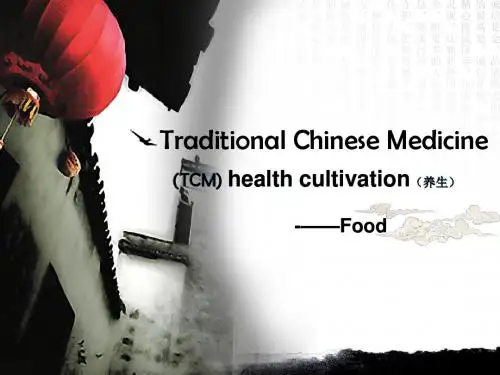中医养生(英语)
- 格式:ppt
- 大小:5.85 MB
- 文档页数:21
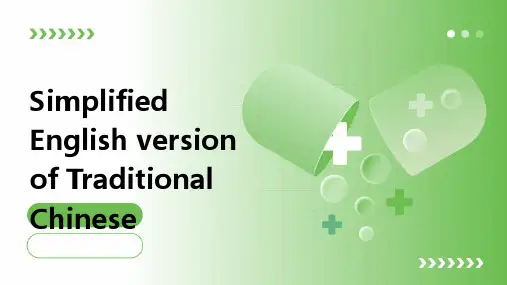
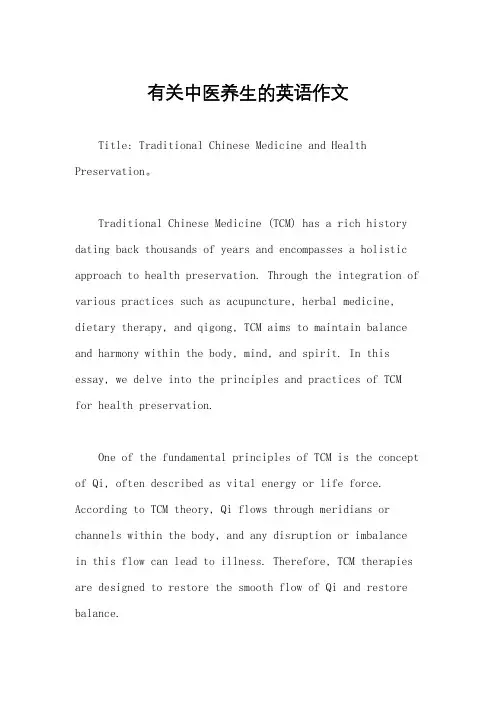
有关中医养生的英语作文Title: Traditional Chinese Medicine and Health Preservation。
Traditional Chinese Medicine (TCM) has a rich history dating back thousands of years and encompasses a holistic approach to health preservation. Through the integration of various practices such as acupuncture, herbal medicine, dietary therapy, and qigong, TCM aims to maintain balance and harmony within the body, mind, and spirit. In this essay, we delve into the principles and practices of TCMfor health preservation.One of the fundamental principles of TCM is the concept of Qi, often described as vital energy or life force. According to TCM theory, Qi flows through meridians or channels within the body, and any disruption or imbalancein this flow can lead to illness. Therefore, TCM therapies are designed to restore the smooth flow of Qi and restore balance.Acupuncture, a well-known component of TCM, involves the insertion of thin needles into specific points along the body's meridians to stimulate Qi flow and promote healing. By targeting these acupuncture points, practitioners can address various health issues, including pain management, stress reduction, and digestive disorders.Herbal medicine is another integral aspect of TCM, with a vast array of medicinal herbs used to treat a wide range of ailments. These herbs are often combined into formulas tailored to individual needs, taking into account factors such as constitution, symptoms, and underlying imbalances. Unlike conventional medicine, which often focuses on treating symptoms, TCM herbal therapy aims to address the root cause of illness and restore overall health.Dietary therapy is also emphasized in TCM as a means of maintaining health and preventing disease. According to TCM principles, food is not only nourishment but also medicine, and different foods have varying effects on the body's balance. For example, foods are categorized according totheir energetic properties such as cooling, warming, or neutral, and individuals are advised to consume foods that correspond to their specific needs and conditions.In addition to acupuncture, herbal medicine, anddietary therapy, TCM includes practices such as qigong and tai chi, which are gentle exercises designed to cultivate Qi, improve circulation, and enhance overall well-being. These mind-body practices emphasize slow, mindful movements, deep breathing, and meditation, promoting relaxation,stress reduction, and mental clarity.Furthermore, TCM emphasizes the importance of maintaining harmony with nature and living in accordancewith the seasons. Each season is associated with specific environmental influences and organ systems in TCM theory, and individuals are encouraged to adapt their lifestyles, diet, and activities accordingly. By aligning with the rhythms of nature, individuals can support their body's innate ability to heal and thrive.In conclusion, Traditional Chinese Medicine offers acomprehensive approach to health preservation that encompasses various therapies and practices aimed at restoring balance and harmony within the body. By addressing the root causes of illness, promoting holistic well-being, and aligning with the rhythms of nature, TCM provides valuable insights into maintaining health and vitality for individuals worldwide.。
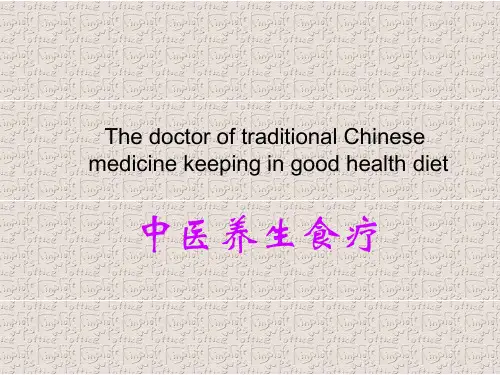
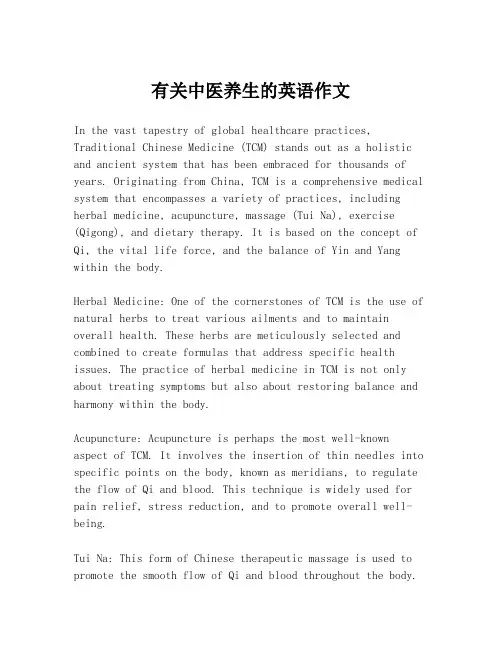
有关中医养生的英语作文In the vast tapestry of global healthcare practices, Traditional Chinese Medicine (TCM) stands out as a holistic and ancient system that has been embraced for thousands of years. Originating from China, TCM is a comprehensive medical system that encompasses a variety of practices, including herbal medicine, acupuncture, massage (Tui Na), exercise (Qigong), and dietary therapy. It is based on the concept of Qi, the vital life force, and the balance of Yin and Yang within the body.Herbal Medicine: One of the cornerstones of TCM is the use of natural herbs to treat various ailments and to maintain overall health. These herbs are meticulously selected and combined to create formulas that address specific health issues. The practice of herbal medicine in TCM is not only about treating symptoms but also about restoring balance and harmony within the body.Acupuncture: Acupuncture is perhaps the most well-known aspect of TCM. It involves the insertion of thin needles into specific points on the body, known as meridians, to regulate the flow of Qi and blood. This technique is widely used for pain relief, stress reduction, and to promote overall well-being.Tui Na: This form of Chinese therapeutic massage is used to promote the smooth flow of Qi and blood throughout the body.Tui Na can help alleviate muscle tension, improve joint mobility, and support the body's self-healing abilities.Qigong: Qigong is a system of coordinated body posture and movement, breathing, and meditation used for health, spirituality, and martial arts training. It is believed to help cultivate and balance the body's vital energy, leading to improved physical and mental health.Dietary Therapy: TCM places great importance on diet and nutrition as a means of maintaining health and treating disease. Foods are classified according to their energetic properties and are chosen to support the body's natural tendencies towards balance.The philosophy behind TCM is that the body has an innate ability to heal itself, and the role of TCM is to supportthis process by addressing the root cause of imbalances. Itis a preventative approach that emphasizes the importance of maintaining a healthy lifestyle, including adequate rest, a balanced diet, and regular physical activity.In recent years, TCM has gained international recognition and is increasingly being integrated with Western medical practices. It offers a unique perspective on health and wellness that can complement conventional treatments and provide a more holistic approach to healthcare.While TCM has been a part of Chinese culture for centuries,it is important to approach it with an open mind and to seek guidance from qualified practitioners. With its rich historyand deep understanding of the human body, Traditional Chinese Medicine continues to offer valuable insights into the art of health preservation.。
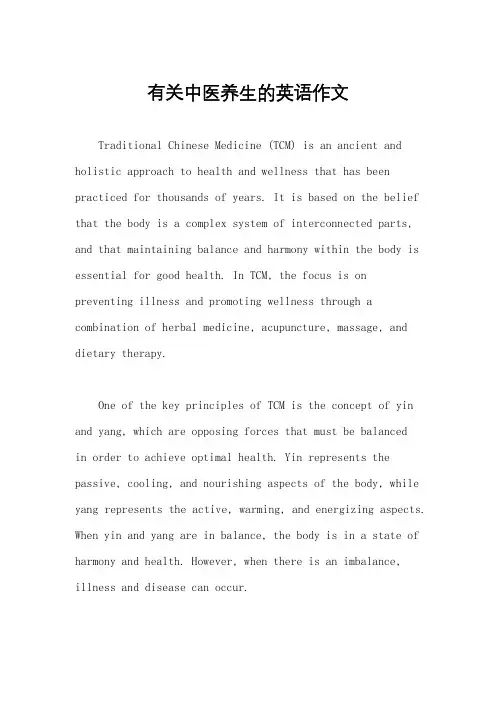
有关中医养生的英语作文Traditional Chinese Medicine (TCM) is an ancient and holistic approach to health and wellness that has been practiced for thousands of years. It is based on the belief that the body is a complex system of interconnected parts, and that maintaining balance and harmony within the body is essential for good health. In TCM, the focus is on preventing illness and promoting wellness through a combination of herbal medicine, acupuncture, massage, and dietary therapy.One of the key principles of TCM is the concept of yin and yang, which are opposing forces that must be balancedin order to achieve optimal health. Yin represents the passive, cooling, and nourishing aspects of the body, while yang represents the active, warming, and energizing aspects. When yin and yang are in balance, the body is in a state of harmony and health. However, when there is an imbalance, illness and disease can occur.Another important principle of TCM is the concept of qi, which is the vital energy that flows through the body. According to TCM, illness occurs when the flow of qi is disrupted or blocked. Acupuncture, which involves the insertion of thin needles into specific points on the body, is used to unblock the flow of qi and restore balance tothe body.In addition to acupuncture, herbal medicine is another important component of TCM. Chinese herbs are used to treat a wide range of health conditions, from the common cold to chronic pain. Each herb has its own unique properties andis prescribed based on the individual's specific needs and symptoms.Dietary therapy is also an integral part of TCM. In TCM, food is seen as medicine, and the emphasis is on eating a balanced diet that is tailored to the individual's constitution and health needs. Certain foods are believedto have specific healing properties and can be used to prevent and treat illness.In recent years, TCM has gained popularity in the West as a complementary and alternative approach to health and wellness. Many people are turning to TCM to address chronic health issues, reduce stress, and improve overall well-being. In addition to its effectiveness in treating a wide range of health conditions, TCM is also valued for its emphasis on prevention and its ability to address the root cause of illness.In conclusion, TCM is a comprehensive and holistic approach to health and wellness that has been practiced for thousands of years. Its focus on balance, harmony, and prevention makes it a valuable addition to modern healthcare. Whether used on its own or in combination with Western medicine, TCM offers a unique and effective way to promote health and well-being. As more people discover the benefits of TCM, it is likely to continue to play an important role in the future of healthcare.。

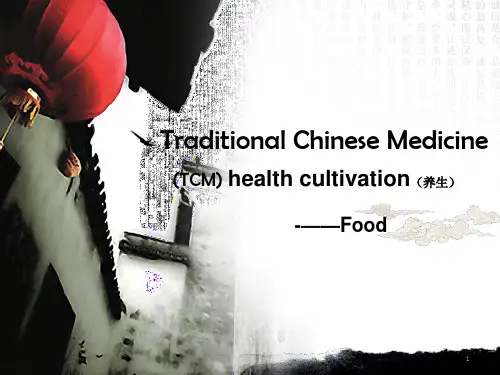


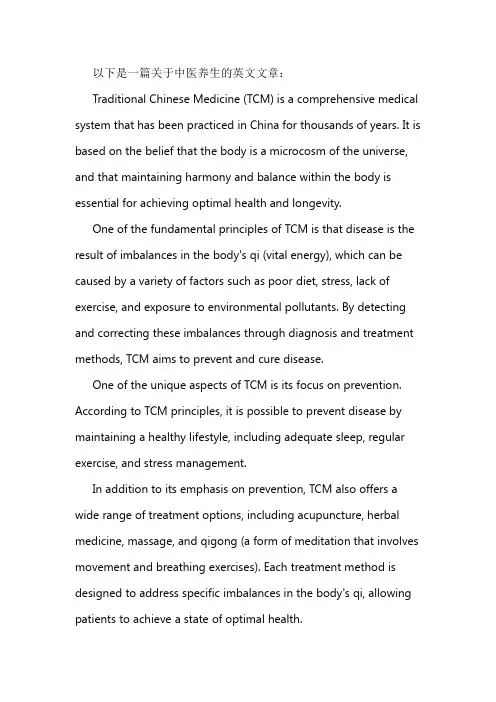
以下是一篇关于中医养生的英文文章:Traditional Chinese Medicine (TCM) is a comprehensive medical system that has been practiced in China for thousands of years. It is based on the belief that the body is a microcosm of the universe, and that maintaining harmony and balance within the body is essential for achieving optimal health and longevity.One of the fundamental principles of TCM is that disease is the result of imbalances in the body's qi (vital energy), which can be caused by a variety of factors such as poor diet, stress, lack of exercise, and exposure to environmental pollutants. By detecting and correcting these imbalances through diagnosis and treatment methods, TCM aims to prevent and cure disease.One of the unique aspects of TCM is its focus on prevention. According to TCM principles, it is possible to prevent disease by maintaining a healthy lifestyle, including adequate sleep, regular exercise, and stress management.In addition to its emphasis on prevention, TCM also offers a wide range of treatment options, including acupuncture, herbal medicine, massage, and qigong (a form of meditation that involves movement and breathing exercises). Each treatment method is designed to address specific imbalances in the body's qi, allowing patients to achieve a state of optimal health.The key to success with TCM is finding a practitioner who is well-trained and experienced in the various techniques of diagnosis and treatment. It is also important to be open and honest with your practitioner about your health history and lifestyle habits so that they can develop an individualized treatment plan that best suits your needs.Overall, traditional Chinese medicine offers a comprehensive approach to maintaining health and preventing disease by addressing the root causes of imbalances in the body's qi. By combining traditional wisdom with modern scientific knowledge, TCM provides a unique and effective way to achieve optimal health and well-being.。
